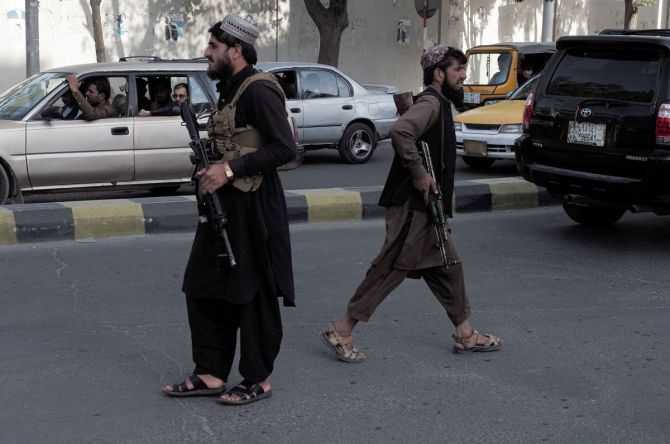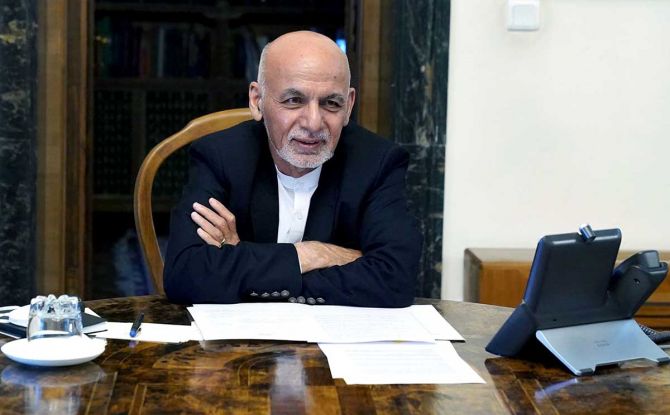'Even during the worst days during the 1990s, India was dealing with the Taliban.'

"The Pakistanis, Chinese, Iranians, Russians will all make demands on the Taliban. How will the Taliban deal with that? It needs a partner like India to balance those demands."
"It makes every sense for the Taliban, therefore, to talk to India," says former ambassador Dr Jitendra Nath Misra.
"That is why Taliban leader Sher Mohammed Abbas Stanekzai sent that message informally that India should maintain its diplomatic presence in Afghanistan," Ambassador Misra tells Rediff.com's Archana Masih.
Dr Misra served the Indian Foreign Service for 34 years and is currently a distinguished fellow at the Jindal School for International Affairs in Sonepat.

As a diplomat with over three decades of foreign service experience, what, according to you, are the difficulties that lie ahead for current Indian diplomats and for Indian diplomacy in dealing with non-State actors like the Taliban ruling Afghanistan now?
Perhaps in partnership with others, we don't know. One should not harbour the illusion that the new Taliban is the good Taliban.
History suggests otherwise for India. India's choices are bad -- and the alternatives to bad choices are worse choices.
The Taliban controls most of Afghanistan, except a sliver of territory in the Panjshir Valley.
Therefore, we have no choice than to engage with the Taliban. But engagement does not mean friendship. As a diplomat, I will say that engagement can also mean struggle.
Whether we can be friends is a huge question. We have to see how the Taliban deals with India's vital interests in the region.
Foreign Secretary, Mr Harsh Vardhan Shringla spoke at the All India Management Association on Friday, August 20, of a 'silver lining'. This is an intriguing statement. We have to listen very carefully to what the Taliban is saying. We need not be taken in by what they are saying, but we have to listen.
More importantly, we have to see and assess very carefully what they are doing.
What tools and manoeuvres will be required from our diplomats to engage with the Taliban considering we've had a history of the Kandahar hijack and have never dealt with them directly?
Indian diplomats are very skilled in dealing with friends and those who are not so friendly.
Historically, we have dealt with different kinds of States and entities. We have the skillset to deal with the Taliban.
We will have to engage the Taliban. We did engage the Taliban in Doha in 2020. In 2018 we sent an 'unofficial' delegation of two former ambassadors to sit in the Moscow meetings on purely a 'listening' brief.
Even during the worst days during the 1990s, India was dealing with the Taliban, though we did not recognise them.
The Taliban's abetment of Pakistan sponsored terrorists into Jammu and Kashmir is very well known.
Hence, we have to listen very carefully to what the Taliban is saying, but it doesn't mean that we have to agree with it.
We have to be extremely sceptical. Extremely vigilant and alert. But we have to keep a door open for further discussions with the new Taliban, which as I said, is not the good Taliban. But a new Taliban could evolve into somewhat a good Taliban.

Our alignment with the Ashraf Ghani government was so deep and obvious which makes us automatically suspect in the eyes of the Taliban. Will this be a major hurdle in establishing any sort of relations with the Taliban?
I'm not sure it will because the situation has changed. The Taliban has been certainly less virulent in its Islamism of the kind that they espoused in the 1990s because the world has changed.
No major power -- neither the United States nor China nor Russia, nor even Iran, and certainly not India -- wants an Islamic Emirate of the kind that the Taliban had previously.
The Taliban needs everybody's support. They also need India. The winner always makes demands. The Pakistanis are winners. The Chinese, Iranians, Russians are all winners. They will all make demands on the Taliban.
How will the Taliban deal with that? It needs a partner like India to balance those demands and some of the pressures from the other powers.
It makes every sense for the Taliban, therefore, to talk to India. That is why Taliban leader Sher Mohammed Abbas Stanekzai sent that message informally that India should maintain its diplomatic presence in Afghanistan.
But as I said, we have bad choices and worse choices. We did the right thing at that point of time.
When the foreign secretary talks about a silver lining -- in diplomatic parlance it means that we are opening some point of contact with the Taliban. We are going to have a conversation because we need to know their policy towards India.
Do you sense a change in the Taliban's attitude this time around in terms of whatever has been seen with regards to Indians in Afghanistan?
They did allow our nationals as well as Afghans of Sikh or Hindu origin to come in flights to India, unharmed.
This is different from what happened in Kandahar in 1999. At that time, they escorted three released terrorists; this time they escorted hapless civilians.
Therefore, we should not keep our eyes and ears blocked to the possibility of a limited understanding with the Taliban.
We must relentlessly work our diplomacy to a level where we convince them that they cannot do to us what they did in the 1990s because the situation has changed and it's not in their interest to do so.
Feature Presentation: Ashish Narsale/Rediff.com











 © 2025
© 2025